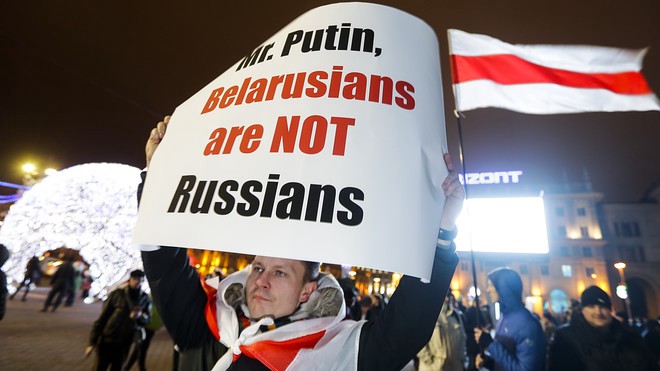
There are obvious similarities between Belarus and Ukraine…there are also differences…
We all know two siblings that are very different. As the saying goes, siblings share genes but rarely personalities. A similar view on Belarus and Ukraine can rightfully be applied. Although not exactly siblings, the two countries share a familial history by way of the Union of Soviet Socialist Republics (USSR) and some partially lost family records…the two countries share the Belovezha Accords which was signed in 1991 by the leaders of Belarus, Russia, and Ukraine, annulling the 1922 union treaty and marking the end of the USSR, and whose original documents have been missing since 2013.
Almost 30 years since their independence (or births), Ukraine and Belarus have different personalities yet their paths continue to cross both politically and economically. Yet, similarly to any other group of siblings, the outside world (i.e., leaders and markets in this scenario) tend to have different impressions of each country and accordingly respond differently to each of them.
Family rules and the stepping out on your own…
Ukraine remains entrapped by an overcooked, crock-pot-like war with Russia that has created chaos and constant outbreaks of violence since February 2014. Although this conflict revolves around the status of the Ukrainian regions of Crimea and Donbass, the conflict is a true manifestation (and battle against) Russia’s ongoing efforts to maintain influence and control in the former Soviet state.
There is little evidence that the conflict will ease soon under Ukrainian President Volodymyr Zelenskyy, who won north of 73% of the vote in 2019 on a pledge to end the conflict and is currently struggling to implement a “special status” solution under the Minsk Agreement. As political analysts speculated during the signing of the agreement, Ukraine wants to provide the disputed regions with as minimal autonomy as possible while Russia obviously seeks a level of autonomy and rights that borders on independence for the two regions. Neither side looks to be moving on its stance.
Belarus has generally avoided this type of conflict with Russia, as critics say, by remaining close to and in the orbit of Russian influence. Russian President Vladimir Putin went as far as suggesting back in 2002 that Belarus could become part of Russia again in future. Yet, with the Belarus presidential election around the corner on 9th August, Belarus-Russia relations are increasingly cold with covid-19 partially ensuring no family reunion anytime soon. Trade disputes between the countries have escalated with Russia blocking imports of certain Belarusian goods and Russia reducing the country’s access to cheap Russian oil and gas.
In response to these disputes, Belarus President Alexander Lukashenko generally responds by engaging in a war of words with Putin and emphasizing his independent thought and decision making as well as an ability to go elsewhere for assistance. Furthermore, with the borders closing due to covid-19, the relationship almost seems on hold, which is odd, considering the historical ties of language, religion, and culture to Russia…let alone the economic history with Russia. Some observers speculate that Lukashenko could imitate former Ukrainian President Viktor Yanukovych at the end of the day and seek a Russian bailout as a last resort…or that Russia may be pushing Lukashenko to a position where a Russian bailout is the only option. Regardless of the reason, a Russian bailout would ultimately be a ‘win’ for Russia — a win Russia did not achieve when Ukrainians exiled Yanukovych to Russia.
Similar genes and similar life struggles…
In the past week, Zelenskyy appointed the head of state-owned Ukrgasbank, Kyrylo Shevchenko, as the head of the National Bank of Ukraine (NBU). The country’s central bank appointment comes on the back of the abrupt resignation of Yakiv Smoliy which raised concerns about the International Monetary Fund’s $5-billion stand-by assistance facility for Ukraine. In June, the MF released $2.1 billion of the aid under the facility. According to an article on Ukrainski Novyny (“Ukrainian News”), President Zelenskyy reportedly promised Kristalina Georgieva, the Managing Director of the IMF, that the NBU would maintain its independence, following a tweet where Smoliy said his resignation was “an answer to systematic political pressure that denied fulfillment of [his] duties as the Governor.”
Fueling the international concern is the mystery of Shevchenko who other bankers and investors partially view as having an unproven track record and lacking clear ‘public’ stances on issues. It is, in other words, not clear how he wants to guide the bank, how he views Ukraine’s economy and politics in the greater scheme of the region, and how he will engage with Ukrainian business tycoon and political influencer Igor Kolomoisky (who is mired in a legal battle with the country’s authorities over PrivatBank which is the country’s largest lender).
As foreign investors will note, any loss of NBU’s independence and subsequently legitimacy will be detrimental for the country. First, NBU is one of Ukraine’s most respected governmental institutions with the admiration of international investors for managing the economic fallout associated with the outbreak of violence in Crimea and the aforementioned conflict with Russia. Secondly, NBU is credited with cleaning-up the Ukrainian banking system following the mess at PrivatBank. Third, NBU is a useful tool and weapon in Ukraine’s fight for national recognition and respect via its ability to guide the country through tough times with Russia and an unsure relationship with the U.S. Many political and market analysts alike would argue that a falloff at the NBU is a quick win for Russian influence or, at least, an opportunity for Russia to create greater chaos and dysfunction (if there is even a difference today between greater influence and chaos).
The central bank of Belarus, The National Bank of the Republic of Belarus, is now facing similar pressure to maintain independence and allay the worries of foreign investors The country’s GDP did not plummet, as seen in other parts of Europe, but many analysts argue that the country’s current numbers are misleading with the IMF projecting a contraction of approximately 6% for the year. While central bank governor Pavel Kallaur highlights Belarus’s ability to avoid a complete lockdown for the country, the global slowdown will still hit the country.
Russia will continue to create problems for Kallaur (and ultimately Lukashenko) through mechanisms of economic warfare. Russia stopped waiving export energy fees for Belarus in 2019, which could cost Belarus additional $300 million in 2021. Battles with Russia over oil also forced the country to order oil from the U.S. (for the first time this year) and other countries. Border closings and restrictions on imports to Russia are also undermining the country’s ability to access hard currency, which critics will claim is necessary for Lukashenko to win the election. He has increased pensions to lure elderly voters and made soft promises to the agricultural industry which is partially hurt by weakened ties to Russia. Lastly, President Lukashenko did not help himself in the fight against Russia by arresting Viktor Babariko — a former banker turned opposition candidate — on alleged claims of money laundering and witness tampering. The arrest seemingly widened the gap between Lukashenko and the Belarusian public and highlighted his weaknesses for Moscow to see.
Different countries as they mature…
Although similarities and storylines can feel all too similar — historians and market analysts like to ponder if Lukashenko could share the similar aforementioned fate as Ukraine’s Yanukovych — the two countries are different. First, Lukashenko is facing his toughest election ever and hoping that his stance against Russia can align with the widespread demonstrations across Belarus against Russian integration from last November and December. Secondly, Lukashenko is not too inclined to fight with the West especially if the West is supplying affordable oil to the country in this current moment. That said, he also knows that the support of the U.S. has a sense of uncertainty attached to it…simply look at the Ukraine president’s awkward relations with the U.S despite the U.S. having more experience (and reason) to support an independent Ukraine.
Additionally, despite all the reasons to befriend the West in greater strides, the fragility and fluctuation in the relationship between Ukraine and the U.S. also makes it is hard for anyone to fully believe Belarus would full risk walking away from strong relations with Russia. Yet, the tough election and weak non-Russian ties in the current state of the world is forcing Lukashenko to rely on old tactics with crackdowns on political opponents and civil activities. The country will also not have any independent observers for the election on 9th August with many already questioning the legitimacy and fairness of the election before it starts. If anything, Lukashenko is sidestepping the binary question of whether to align with Russia or to align with the West and is rather saying ‘I can do it myself.’
Markets will not treat them the same either…
Markets also agree that the two countries are different. The uncertainty of the election outcome (and potential transition of power) creates an air of concern among international investors. A prolonged election or prolonged return to normalcy post-election will be detrimental to the economy when it is already at one of its weakest points in a long time. Let’s not forget that back in March, Deputy Head of the Presidential Administration Dmitry Krutoi (then First Deputy Prime Minister of Belarus) was quoted as saying that the country was considering the restructuring of some external debt due in 2020. As result of a confluence of factors, Belarusian sovereign debt spreads have widen in the last couple weeks due to perceived risk.
That said, Ukraine’s financial situation is not that much better. Its debt bill of around $4.1 billion for 2020 is only slightly higher than Belarus. The Ukrainian economy will also face a contraction like the rest of Europe and, unlike Belarus, still must fund a war with Russia whether on the physical or economic battlefield. Yet the markets are way more trusting of Ukraine because of the NBU’s history, a better understanding of country’s economic policy, and Ukraine’s openness to investors of any ilk and nationality. Though it is not clear how much time investors and international lenders are willing to give Shevchenko (and Zelenskyy for that matter) to prove he is the right guy for the job.
At the end of the day, many international investors and western politicians will feel inclined to say the two countries are similar in many ways (i.e., like siblings). But the theory of environment may help to explain why these two countries have broken their family ties. Children psychologists argue that although from the outside it appears that siblings are growing up in the same family, in very important ways they are not experiencing the same things in the same way and at the same age. The reality of Belarus and Ukraine is that although there is familial history, they have not experienced Russia and the world (i.e., international markets) in the same way nor at the same time in their growth, which ultimately explains why some people are shorting the outlook of Belarus more than Ukraine at this point in time. Or better put, one of the countries, Ukraine, looks like the more mature and well-rounded option than the country it seated next to (at least for the moment).
